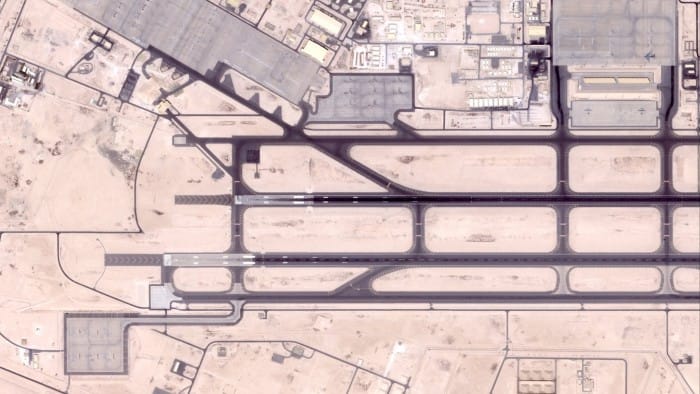
Unlock the White House Watch newsletter for free
Your guide to what Trump’s second term means for Washington, business and the world
Donald Trump has thanked Iran for giving the US advance notice of a barrage of missiles against the biggest American air base in the Middle East and said he would encourage Israel to make peace.
In comments on his Truth Social network on Monday, Trump described the Iranian attack on the Al Udeid base in Qatar as “very weak”, stating that of 14 missiles fired, 13 were intercepted and one allowed to complete its path without causing harm.
“CONGRATULATIONS WORLD, IT’S TIME FOR PEACE!” the US president wrote, adding that the Iranians had “gotten it all out of their ‘system,’ and there will, hopefully, be no further HATE”.
He said: “I want to thank Iran for giving us early notice, which made it possible for no lives to be lost, and nobody to be injured. Perhaps Iran can now proceed to Peace and Harmony in the Region, and I will enthusiastically encourage Israel to do the same.”
The comments from Trump came just hours after Iran’s attack on Al Udeid, which the US president said had resulted in no American or Qatari casualties.
Oil prices fell as traders calculated that the attack was largely symbolic, and could signal an effort by Iran to avoid a full-blown conflict, despite the risk that it could trigger a robust response.
In a message on X, Ayatollah Ali Khamenei, Iran’s supreme leader, wrote: “We did not assault anyone and . . . we will not surrender to anyone’s assaults. This is the logic of the nation of Iran.”
While Iranian state television claimed six missiles hit the base, Qatar foreign ministry spokesperson Majed al-Ansari said the country’s air defences “thwarted the attack and successfully intercepted the Iranian missiles”. He added that there were no casualties.
The sprawling base just outside the Qatari capital is the US Central Command’s regional headquarters and typically hosts about 10,000 American troops. But most personnel were evacuated last week and aircraft and other equipment moved as regional tensions soared.
Qatar closed its airspace earlier on Monday in expectation of an Iranian attack. The US and UK embassies in Doha had also told their citizens in the small Gulf state to “shelter in place”.
The Iranian attack came just over a day after Trump ordered the US military to drop “bunker buster” bombs on Fordow and Natanz — Iran’s main nuclear sites — as Washington joined Israel’s 10-day war against the Islamic republic.
Shortly before the attack, Major General Abdolrahim Mousavi, chief of Iran’s armed forces, said Trump had “violated all international norms by breaching the airspace of our beloved country”, adding: “The crime itself and the blatant disrespect cannot go unanswered”.
Iran launched a similar attack against the US in 2020 when it fired missiles at two US bases in Iraq after Trump ordered the assassination of Qassem Soleimani, Iran’s most powerful commander. The assault was telegraphed and caused no damage, and both sides stepped back from the brink of a full-blown war.
But as news circulated of Monday’s explosions, which were preceded by air raid sirens, a regional official said the attack would “will undoubtedly impact the relationship-building efforts that have been under way between” Iran and its Arab neighbours.
Airlines including British Airways, Air France, Kuwait Airways and Etihad Airways had previously cancelled or rerouted some destinations in the Gulf.
BP, TotalEnergies and Eni have begun to evacuate foreign staff from oilfields in southern Iraq amid fears that Iran could target energy infrastructure in the region.
Regional states have been on edge since Israel launched its war against Iran, fearing an attack on US bases or energy facilities. They also worry that Iran could seek to block the Strait of Hormuz, the waterway through which around a quarter of the world’s seaborne crude passes.
Israel widened its strikes on Iran earlier on Monday, hitting sites in Tehran, including the notorious Evin prison, and the headquarters of the Basij, a force linked to the elite Revolutionary Guards.
Israel’s defence minister Israel Katz said the military would continue striking Iran as long as the Islamic republic kept firing at Israel.
But two people familiar with the Israeli government’s thinking said that given the damage it had already done to Iran’s ballistic missile and nuclear capabilities, it was looking for ways to wind up the conflict.
“Israel can ‘close’ this operation in the coming days, and is willing to. It depends on the US, the international community, and most of all the Iranians,” one of the people said.
Additional reporting by James Politi and David Sheppard







